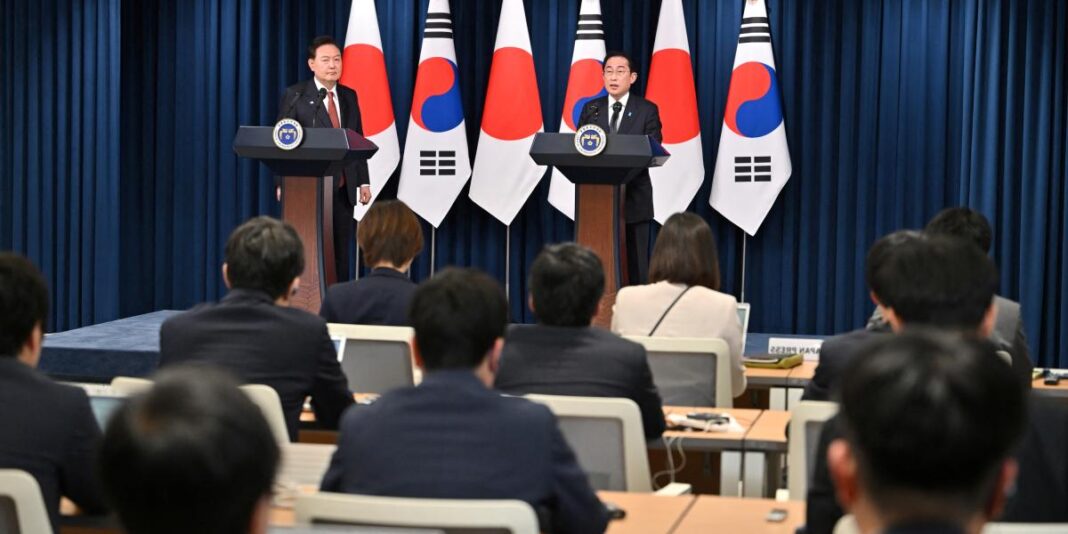Seoul, South Korea – In a world where technology crosses borders, the relationship between Japan and South Korea stands as a delicate dance, each step heavy with the past yet reaching for the future. It was in 2019 when Naver and SoftBank, two giants from South Korea and Japan, dared to step together into the ring, forming a 50-50 joint venture over the Line app, an innovation born from necessity after Japan’s 2011 earthquake. What started as a hopeful sign of cooperation now faces the strains that history knows so well.
Line, the app that bridged silences in the wake of disaster, connected hearts and words where phone lines had fallen. It became more than just an app. To Japan, it became a lifeline. For South Korea, it was a symbol of what could be built—strong, unshaken, and resilient. Now, as the two nations edge forward, still marked by wounds from an era long past, a breach in Naver’s cloud system has opened a door to discord once again.
History Echoes in Modern Tensions
Five years have passed since Masayoshi Son of SoftBank and Hae-Jin Lee of Naver stood shoulder to shoulder, their partnership an emblem of a new future. The world watched as two countries, shaped by history’s hard hands, seemed to step beyond, creating not just a business deal but perhaps a bridge to healing. Yet, old wounds often bleed with little notice. This time, it was a cyber breach that reignited flames that had never fully dimmed.
Last November, LY Corporation, the operator of Line, reported that an unauthorized entity had slipped into its system via Naver’s cloud storage. While this event may have been born of code and technology, the tremor it sent rippled far beyond. Japan’s Ministry of Communications, cautious and unclear in its words, issued a statement many read as a call for Naver to sell its stake in Line. In the silence that followed, murmurs of suspicion grew louder in South Korea. The question hung in the air—was this about business, or was it another subtle move in the long shadow of geopolitical tension?
Old Wounds and New Questions
No matter how far you walk from the past, some questions always linger. To Choi Soo-Yeon, Naver’s CEO, Japan’s actions seemed “unusual,” an echo of history that South Korea knows all too well. Could this be a power play? A political move disguised as a corporate decision? The answer is unclear, but what is clear is that the stakes are much higher than just an app.
Those who study these things—the diplomats, the analysts, the experts in international relations—are watching with bated breath. Maiko Takeuchi from the Center for Cyber Security and International Relations (CCSI) reminds us that these moments are not new. “In time, small cracks have a way of deepening,” she said. “History between Japan and Korea has always walked a fragile line, and even the smallest tremor can become a quake that shakes the region.”
A Breach Beyond Business
There are no simple solutions where history and technology intertwine. The 2024 dispute over Naver’s ownership of Line is no mere business matter; it touches upon the core of what still simmers beneath the surface of Japan and South Korea’s diplomatic relationship. Despite recent efforts to repair the bond, scars remain. The colonial era, a time both nations are still healing from, has left its mark on every aspect of their interactions. In 2018, a military incident sparked a diplomatic freeze that took years to thaw. And now, once more, a digital breach might turn a business deal into a symbol of something much more profound.
As the Line app reaches millions of users across Asia—from Japan to Thailand, Taiwan, and Indonesia—the question of who controls it becomes not just an issue of profit, but of influence. If Japan insists on Naver stepping back, what does that mean for the balance of power in the tech world? And what of the shared future that Yoon Suk Yeol, South Korea’s president, and Fumio Kishida, Japan’s Prime Minister, have pledged to work toward? The two leaders, who recently met to reaffirm their commitment to mending ties, must now navigate this new tension with care.
A Path Forward, or a Return to the Past?
In the end, as SoftBank and Naver explore ways to resolve the issue of ownership, the future of the Line app—and indeed, the future of Japan-South Korea relations—remains in question. Both countries have much to lose, and much to gain, from how this dispute is handled. Will they find a way to navigate these historical tensions? Or will the past once again prove too strong to overcome?
Time, as always, will tell. But as Yul Sohn, president of the East Asia Institute in Seoul, so wisely reminds us, “Both nations are keenly aware of the weight of history. They know that the past is never truly gone, and the future is never truly certain.”


